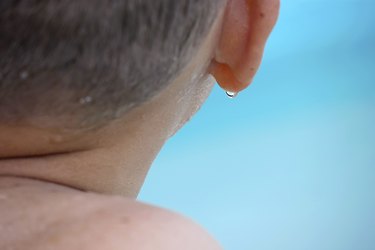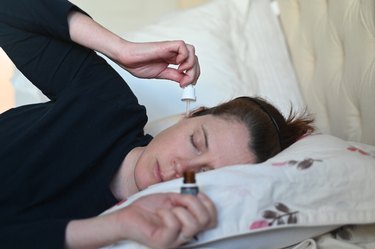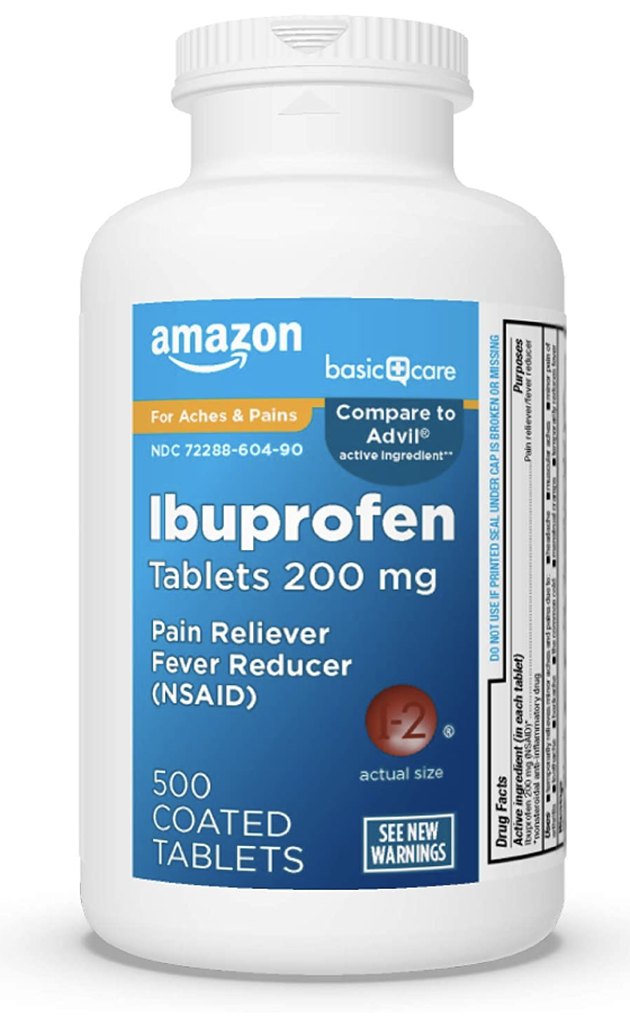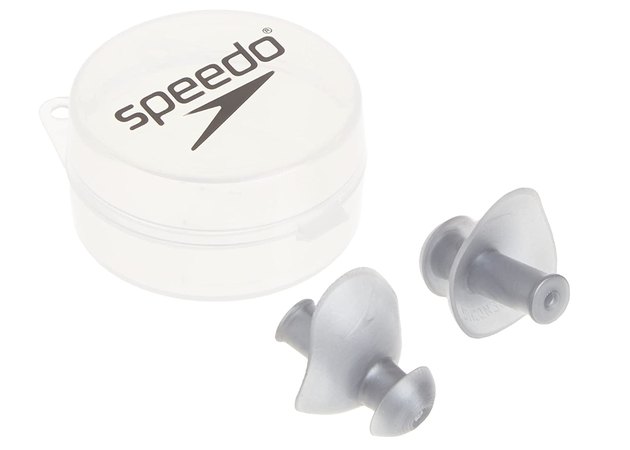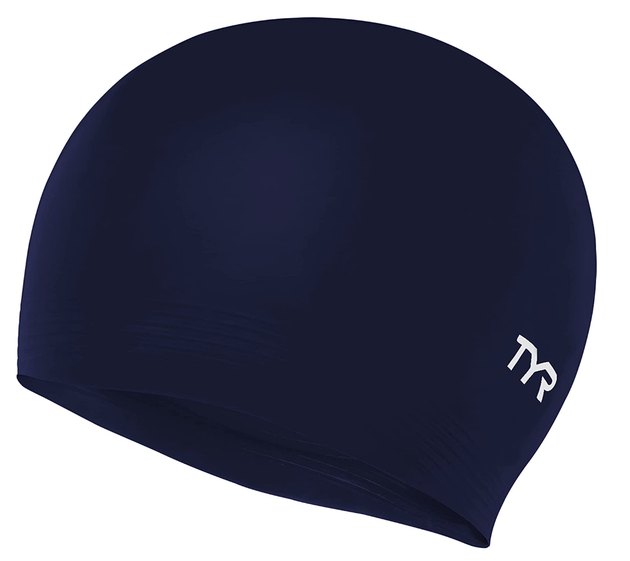
Swimmer's ear is a term used to describe an infection of the soft tissues of the ear canal. "It is typically bacterial and leads to severe pain," says neurotologist Elina Kari, MD, assistant professor of surgery at UC San Diego Health.
"You can also have swelling so bad it can occlude the ear canal and cause hearing loss," Dr. Kari says. Another common symptom is drainage, which is essentially pus dripping from the ear.
Video of the Day
Video of the Day
We know you want to school yourself on natural treatments for this excruciating infection. But here's the truth: "If you suspect you have swimmer's ear, it's important to seek immediate medical attention," Dr. Kari says. "Usually people need topical antibiotic ear drops, which are only available by prescription."
Untreated swimmer's ear can lead to recurring ear infections as well as bone and cartilage damage, according to Johns Hopkins Medicine. The infection can also spread to surrounding tissue, the skull, brain and cranial nerves. Trust the experts, people — you do not want to risk it.
That said, if you're suffering in the interim before an appointment with your doctor or urgent care, there are home remedies you can try to ease the symptoms. Consider giving these methods a whirl.
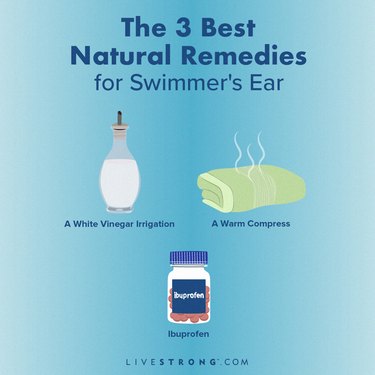
1. White Vinegar Irrigation

Swimmer's ear typically occurs when the pH of your ear is disrupted, allowing bacteria to grow. This can happen if you've been in the water and the inside of your ears stay damp. An August 2013 study in Environmental Health found that 1.6 percent of people reported having an earache 10 to 12 days after visiting the beach, and were more likely to have ear issues if they'd submerged their head in H20.
Acidifying your ear can help balance your pH to prevent infection, and might make you feel a bit better while biding time before your doctor's visit.
A white vinegar solution "may be effective…but has never been evaluated in clinical trials," according to a February 2014 study from the American Academy of Otolaryngology-Head and Neck Surgery (AAO-HNS).
"Mix equal parts white vinegar and water," Dr. Kari says. "Using a medicine dropper or bulb syringe, put five to six drops in your ear to flush it out."
2. Warm Compress

Heat therapy might help minimally with pain management, but won't resolve the infection. The AAO-HNS study determined heat was of "unproven value."
"Microwave a moist towel for 20 seconds," Dr. Kari says. "Touch it against the inside of your wrist to make sure it's not too hot, then apply it to your ear." Use as needed.
3. Ibuprofen

In the AAO-HNS study, non-steroidal anti-inflammatory drugs (NSAIDs, such as ibuprofen) "significantly reduced pain compared with a placebo."
Dr. Kari suggests taking up to 800 milligrams to help ease pain and swelling if you can't see your provider right away.
It's very important to note that this dosage should only be used in healthy adults. If your child has swimmer's ear, ask your pediatrician what medication and dosage is safe for them to take.
What About Analgesic Ear Drops?
You can purchase analgesic ear drops over the counter. "They are painkillers and contain lidocaine, which numbs the area," Dr. Kari says.
Although they'll probably improve your discomfort, it's not the best course of treatment. "I would not recommend analgesic ear drops," Dr. Kari says. "While they mask the pain, they tend to delay care and the infection can get worse."
What About Garlic Ear Drops?
"These have been reported to have antimicrobial properties," Dr. Kari says. A December 2019 study in the Turkish Archives of Otorhinolaryngology found that garlic derivatives effectively inhibited microorganisms commonly responsible for swimmer's ear.
"There is probably no harm in trying it," Dr. Kari says, "But I can't say whether they are actually effective in resolving an infection."
Bottom line: Garlic ear drops are no substitute for a trip to the doctor.
What About Hydrogen Peroxide?
"Hydrogen peroxide cleans your ear but doesn't resolve the problem," Dr. Kari says. Same goes for rubbing alcohol, which will also make your ear sting.
How to Prevent Swimmer's Ear
Next time you go swimming or just take a dip at the beach or pool, consider protecting your ears with a swim cap or other swim equipment, such as ear plugs.
Here are a couple products you might want to have on hand to help avoid swimmer's ear in the future:
FAQ
1. How Can You Tell the Difference Between an Ear Infection and Swimmer's Ear?
Swimmer's ear is actually a type of ear infection.
"The ear is divided into three compartments," Dr. Kari says, "The outer ear, which is ear canal; the middle ear, which is the space behind the ear drum; and the inner ear, which is responsible for hearing, balance and the conversion of mechanical signals into electrical signals that go to the brain."
You can get an infection in any of the three parts. Swimmer's ear, aka otitis externa, describes an infection of the outer ear canal.
"Middle ear infections are what we refer to when little kids have ear infections," Dr. Kari says. "It causes pain, fever, hearing loss and drainage if the ear drum is ruptured."
Inner ear infections may not have any outward signs, although people can experience hearing loss and vertigo.
Also good to know: There are two different types of swimmer's ear. Usually the infection is bacterial, but sometimes it can be fungal. While there are topical over-the-counter antifungals that you can use, it's pretty much impossible to distinguish a bacterial from a fungal infection because they present the same.
"Even experienced doctors can't always tell without examining the ear with a microscope," Dr. Kari says.
2. Why Is Swimmer's Ear So Painful?
The outer ear plays a key role in collecting and processing sound. "It contains five cranial nerves that send sensory information to the brain — it is essential to our sense of hearing," Dr. Kari says. "We probably evolved to develop extra sensitive ears so that we will keep things out of them!"
She explains that if you touch someone's ear drum very gently with a small instrument, they will bounce off your table because it is so painful. "Part of your ear canal is squishy and it's typically no big deal if you touch it," Dr. Kari says. "But another part is plain skin on bone and is exquisitely sensitive to touch."
Once your ear canal gets infected, those tissues become super swollen as blood supply rushes to the area. "When any part of your body is infected and swollen, it tends to hurt," Dr. Kari says. "In the ear, it hurts that much more because it is so sensitive to begin with."
3. What Is the Fastest Way to Cure Swimmer's Ear?
As soon as you use prescription antibiotic ear drops, you will feel instant relief. After a day or two, you should notice significant improvement. Keep taking the antibiotics for the full course as prescribed, even when symptoms abate.
Sometime the swelling can be so bad that you physically can't get the drops in. "In that case, an ENT [ear, nose and throat doctor] can place a wick in your ear canal," Dr. Kari says. "This is basically a tiny 'ear tampon' that expands to keep the space open and soaks up the drops to hold them in the canal for more direct treatment."
4. Will Swimmer's Ear Go Away by Itself?
Probably not. "If it were a really mild case, perhaps," Dr. Kari says. "But the vast amount of time it requires medical attention."
- Johns Hopkins Medicine: "Swimmer's Ear"
- Environmental Health: "The incidence and health burden of earaches attributable to recreational swimming in natural waters: a prospective cohort study"
- AAO-HNS: "Clinical Practice Guideline: Acute Otitis Externa"
- Turkish Archives of Otorhinolaryngology: "Antimicrobial Activity of Garlic Derivatives on Common Causative Microorganisms of the External Ear Canal and Chronic Middle Ear Infections"
Is this an emergency? If you are experiencing serious medical symptoms, please see the National Library of Medicine’s list of signs you need emergency medical attention or call 911.

